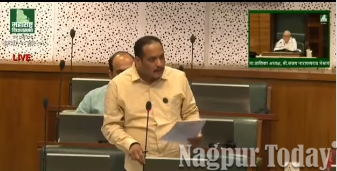
Nagpur: In a hard-hitting statement that exposed the stark gap between law and ground reality, Nagpur Central MLA and BJP leader Pravin Datke on Friday revealed in the State Assembly that Nagpur has the highest number of paan shops in the entire country, where banned products like kharra, gutka, and paan masala are being sold openly with impunity.
Despite a long-standing ban on these tobacco-based products in Maharashtra, Datke claimed that illegal sale and consumption are rampant in Nagpur — ironically, the hometown of Chief Minister and Home Minister Devendra Fadnavis.
“Where are the rules? Where is the enforcement?” Datke questioned pointedly on the floor of the House, exposing how regulations meant to curb the sale of harmful products exist only on paper in the second capital of the state.
Nagpur’s oral cancer woes
The MLA further highlighted a disturbing consequence of this unchecked menace — Nagpur also reportedly ranks among the top cities in India for oral cancer cases, directly linked to the easy availability and widespread consumption of banned tobacco products.
Medical experts have long warned that gutka, kharra, and paan masala are primary contributors to oral and throat cancers, with Maharashtra being one of the first states to impose a blanket ban on their sale and manufacture nearly a decade ago. However, enforcement has remained lax, particularly in urban pockets like Nagpur.
A public health time bomb
Datke’s remarks have reignited the debate over the state’s failure to control the flourishing underground trade of these products. Local residents and health activists have repeatedly raised concerns over the mushrooming of paan kiosks across the city, especially near schools, colleges, and public spaces, making it easy for youth and minors to fall prey to addiction.
The presence of these kiosks is so widespread that in some localities, they outnumber medical shops, residents allege.
The MLA’s intervention has put the spotlight back on the role of municipal authorities, police, and state enforcement agencies, who are routinely accused of turning a blind eye to the rampant sale of banned items, allegedly due to local political patronage or bribery.
While the ban exists in law, Datke’s revelations in the Assembly have made it clear that Nagpur’s streets tell a different story — one where rules are flouted openly, and public health is the price being paid.
The ball is now in the government’s court to prove whether the laws are mere formalities or will be backed by strict, visible action on the ground.














